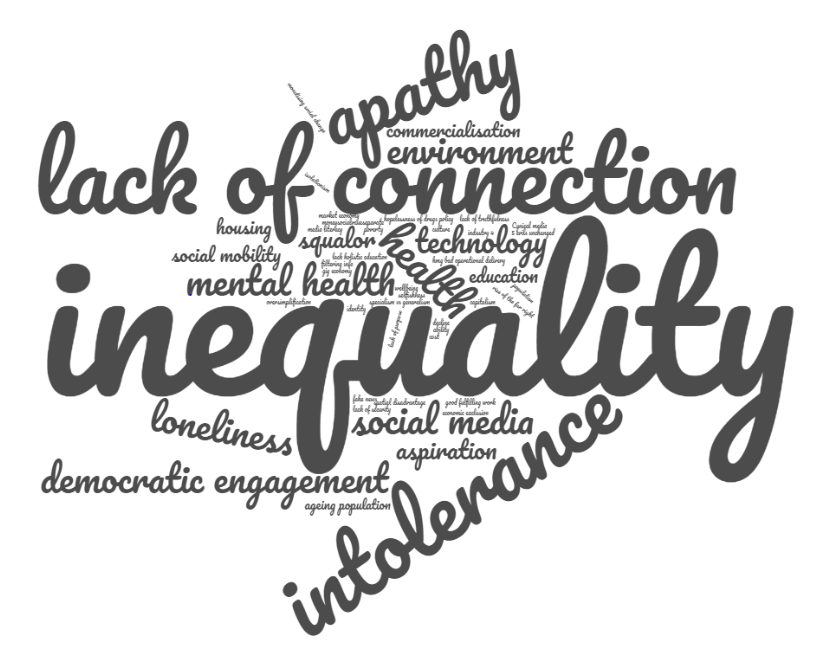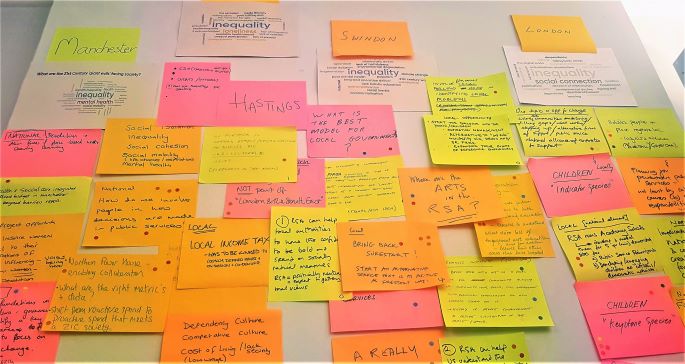Over the past two months the RSA’s Action & Research Centre has been undertaking a review of its work on public services and communities. As part of this we have held a series of regional events in order to gather the experiences and expertise of RSA Fellows and others working in the fields of public service and inclusive growth. At every event we asked the question: if William Beveridge was around today, how would he frame Britain’s new ‘giants’? This is what people told us.
Beveridge identified five giants in 1942 and some people at our events were quick to evaluate whether anything much has changed. There remains ample evidence of squalor, ignorance, want, idleness and disease but the majority felt that even if today’s giants had similarities with those of Beveridge they would be described very differently as our word cloud of responses suggests.

In pole position today comes inequality. This was mentioned most frequently at every single event and led to some fascinating discussions about its nature. Income and wealth inequality were at the forefront of people’s concerns and considered symptomatic of a society that had lost its moral compass. But in places like Manchester and Hastings there was a deep sense of spatial inequality too with a deep resentment towards London. Racial and gender inequality were also significant concerns as was the impact of inequality on our physical and mental health.
Secondly, many event participants were concerned with what was often phrased a ‘lack of connection’. Much as our travelling around the country laid bare the weaknesses of Britain’s transport infrastructure outside the capital, this lack of connection was much more profound. Isolation and loneliness were highlighted as key contributors to the apparent deterioration in the nation’s mental health – and nowhere was this felt more acutely than in London itself. Lack of connection even in the nation’s best connected city.
Third came ‘intolerance’ with many reflecting on the apparent polarisation evidenced by the Brexit referendum, the current state of party politics and the emergence of populist regimes around the world. Linked to this, some people spoke of ‘Fake News’ and a perceived lack of truthfulness at both personal and institutional levels which fuels division and exclusion. Heated debates ensued about the role of technology – and social media in particular – while few saw them as social evils, there was widespread concern about their regulation to mitigate their worst effects.
Giant number four was apathy. For some people this related to a sense of hopelessness and lack of aspiration in certain quarters but most saw the problem as symptomatic of our broken democratic system and people’s sense of deep disempowerment. Once again, recent political events loomed large: the pros and cons of referenda, the state of our political parties and our highly centralised decision-making structures.
Fifth and finally there was a profound concern for the environment. Naming the environmental evil about which we should be most concerned was more difficult. Some were concerned about energy use, our consumptive culture and air pollution while others spelt out more conservationist agendas concerning the future of housing, food, farming and the countryside.

Inequality. Isolation. Intolerance. Disempowerment. Environment. The five giants facing 21st century Britain. Taking the thought experiment a little further: if we were to redefine the respective roles of state and society in addressing these agendas what kind of system would we create? What kind of outcomes would we want to see? And how far would the policies and institutions we could develop resemble anything Beveridge would recognise? Event participants had countless ideas for opportunities ahead, pictured above. These are questions to which we will turn in the months ahead.
Many thanks to everybody who has participated in our review to date. We look forward to further engagement in the months ahead though feel free to post your further comments below. We look forward to outlining a new programme of work towards the end of the year.
Related articles
-
Blog: Can we ensure that civic energy and social justice go together?
Anthony Painter
Anthony Painter considers what it will take for us to combine civic energy and social justice as the drive towards devolution gathers pace.


Join the discussion
Comments
Please login to post a comment or reply
Don't have an account? Click here to register.
Here in Australia, such an exercise might throw up alternative 'big giants' but the 5 above resonate very strongly:
Inequality: the 'Closing the Gap' initiative has had little success; the gulf between Aboriginal & non-Aboriginal communities is as wide as ever (including a 10-year gap in life expectancy).
Intolerance: racism on the rise, the Government stirring up fear, the far right party One Nation getting 16% of the primary vote in a recent by-election, and we've just had former PM Tony Abbott suggesting a total ban on immigration from African countries!
Environment: still no national energy & climate policy after 10 years of destructive debate, and several prominent Government MPs arguing for "getting out of the Paris Agreement"
Isolation: widespread problems with isolation, loneliness, suicide (including a recent murder-suicide in an isolated rural area with 4 children & 3 adults dead), and a drought emergency (with some areas having had no rain for 7 years)
Disempowerment: I could list examples for weeks!
Very depressing at times, but we need to prioritise & focus our efforts to have impact, and surround ourselves with positive people and positive energy.
Thanks Ed for that summary of all responses to your consultation. I found the London event stimating and engaging - with lots of ideas for action, as you say, from both Fellows and others keenly interested. RSA Fellowship has enormous potential to contribute to this programme. What scope do you see for that?
I always like to ask 5 questions before I take any action to improve anything important. We want to reduce our society's problems with the modern 5 giants: inequality, isolation, intolerance, disempowerment and environment. We need to ask for each one? 1. What are we trying to achieve? 2. What is already known about this problem? 3. If we are successful in making progress - what will success look like and what are our success criteria? 4. With the resources available to us what can we realistically achieve? 5. When and how will we review what we are trying to do? Its a good starting point for making any progress.
Thanks Terence - that's precisely the kind of process we are now exploring!
John Hagel III differentiates a strategy of terrain from a strategy of trajectory. Might the 5 WHY mislead you into a strategy of terrain, when what's needed is a strategy of trajectory? To explain the difference in few word I articulate right now that in the first strategy you are able to have a roadmap, but not in the second in which you need to create a new path to the true north.
In my systems architecting practice, with thought experiments mainly in Twitter, I discovered using a heuristic methodology the true north with the hashtag #BG_NS, which is short for the #BrightGlobalization North Star. I have been recently discussing my findings in association with Ed's article WHY THERESA MAY SHOULD REACH FOR HER INNER PANKHURST: TIME FOR A NATIONAL CITIZENS’ JURY ON BREXIT . (At this time there are 29 comment, with my last two comments one for PAUL VITTLES and the other with a synthesis for Ed Cox, but have not been posted yet).
To me those giants are Wicked problems as a result of the end of the useful life of Adam Smith's The Wealth of Nations. Of course, while it served its purpose very well, it is now an ineffective a strategy of terrain. To address those problems and in fact dissolve them, I have updated Victor Hugo's quote as "There's nothing so powerful as #TheWealthOfGlobalization whose time has come,“ for an effective strategy of trajectory towards the #BG_NS.